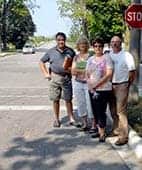Wellesley’s hilly roads and scenic landscapes draw avid cyclists who, in turn, cause trouble for drivers. Now, it’s a problem for township council.

Two upcoming large-scale events – the Charity Bike Ride on August 24 and the Ride for Refugees on October 5 – led councillors meeting Tuesday night to discuss cycling safety, with each of those around the table offering up stories of unsafe biking.
Citing regular complaints from township residents of cyclists riding two or three abreast on roads, Coun. Jim Olender questioned if enough is being done to enforce the rules of the road.
“The sad part about it is, one lady said to me, ‘I asked them to move over, and I got this,’” said Olender, displaying his middle finger.
In the Region of Waterloo, cyclists are required by law to ride single-file along the side of roads, but all four councillors plus Mayor Ross Kelterborn had firsthand experience of that rule going out the window.
“Tragically, our roads are just not designed to accommodate these people going two, three abreast,” said Coun. Herb Neher. “Especially when you’re going uphill, unless you sit behind going five clicks an hour and wait 10 minutes until you’ve got proper vision. You’re not going to take the chance to go around them and have a car whipping ‘round the other way at 80 clicks.
“Unfortunately, I can predict we’re going to have more accidents,” he added.
“I think part of the problem is, the bikers are not residing in our areas,” said Coun. Shelley Wagner. “A lot of them are coming from the city, so they’re not biking in their own backyard – they’re biking in our backyard.”
She continued, “The horse-and-buggies, the drivers, and the farmers use the roads as a means of transportation. That is our way to get to and from where we need to go. These bikers are coming out, and this is a pleasure ride. … It’s not their only means of transportation, and I think people are just getting frustrated.”
Olender suggested that because drivers are almost invariably charged in car/bike collisions, this may encourage a lack of responsibility among some cyclists.
Kelterborn expressed concern that the upcoming Ride for Refugees would involve 1,000 participants, making enforcing the single-file rule all but impossible. Kevin Beggs, general manager of community services, told council that he convinced organizers of the Ride for Refugees to distribute flyers to mailboxes announcing the event. The August 24 charity ride was too quickly approaching to make a similar arrangement.
“They are wanting to be accommodated into our road system – a road system that accommodates a vast majority of bicycle people every day,” said Willis McLaughlin, chief administrative officer.
“They go to school and back, work and back, the store and back, on their bicycles. The specialty groups who seem to be garnering all the attention, I would suggest they’re probably less than 10 per cent of the bicycles that are active in our township every day. We never hear from the majority.”
The discussion concluded with Kelterborn instructing Beggs and staff to ask other townships, particularly Woolwich, if they have received similar complaints from drivers.
“It’s just something we have to make these bike clubs aware of,” said Olender. “There are concerns. The public has concerns; people that live here have concerns. Nobody wants to be in the position where they’re the one that hits somebody.”









